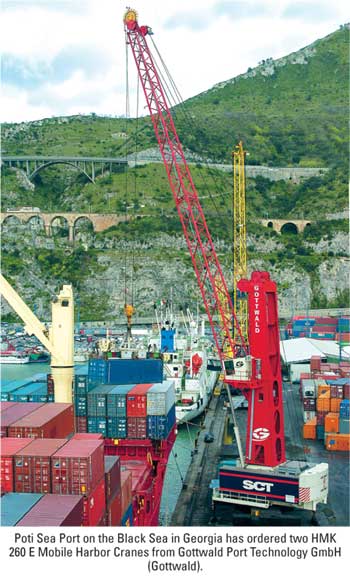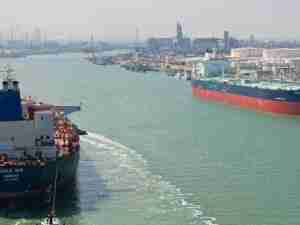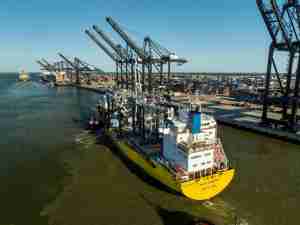Poti Sea Port on the Black Sea in Georgia has ordered two HMK 260 E Mobile Harbor Cranes from Gottwald Port Technology GmbH (Gottwald). The cranes each have a maximum lifting capacity of 100 t and a maximum radius of 44 m and are therefore the ideal machines for handling containers alongside ships up to standard class. This new order is already the second successful sale to Georgia in one year for this crane manufacturer from Düsseldorf. Since the summer of 2008, two other HMK 260 E Mobile Harbor Cranes from Gottwald have been working in the Batumi International Container Terminal.
The new cranes have left the Düsseldorf factory in July and are scheduled to start commercial operation in the Port of Poti in September 2009. While initially it is planned to use them predominantly for container handling, in future the operator also intends to handle bulk material with motor grabs, which is a simple matter thanks to the universal character of the machines and the possibility of high-speed changing of the lifting gear.

Rony Saab, General Director of Poti Sea Port, remarked on the new order: “We opted for Mobile Harbor Cranes from Gottwald because we needed a handling machine that is both economical and universally applicable and because HMK 260 E Mobile Harbor Cranes have gained a good reputation in many of the world's ports with regard to handling rates, reliability and total cost of ownership. The new cranes will open up new opportunities for us, making us more flexible and helping us to continue to increase the competitive advantage of our port.”
Jan Lind, Gottwald’s Regional Sales Manager, said: “The entire Black Sea region is an important operational area for Gottwald Mobile Harbor Cranes of various sizes and performance ratings. I am pleased that, last year, we were able to gain a foothold in Georgia and that the Poti Sea Port has now also placed its trust in us. Thanks to its excellent efficiency, the diesel-electric drive as used on all Gottwald Cranes provides extremely economical operation and low fuel consumption, which also benefits the environment, a matter of increasing importance.“










